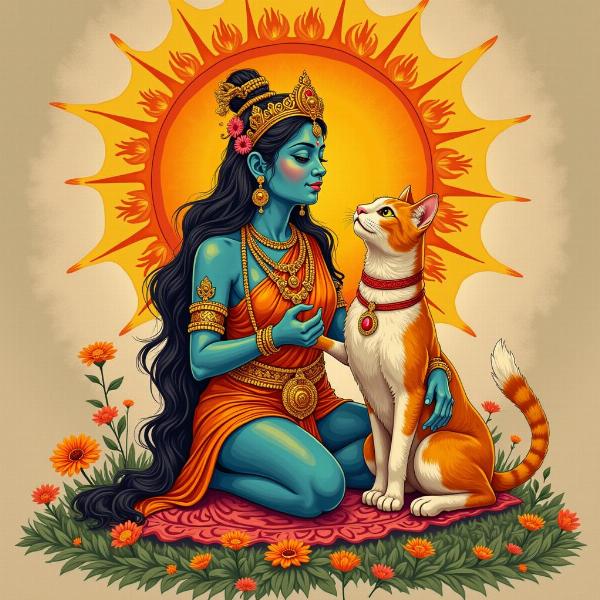Understanding the simple phrase “this is a cat” is a fundamental step in learning Hindi. This seemingly basic sentence opens the door to grasping Hindi grammar, vocabulary, and even cultural nuances related to animals. Whether you’re a beginner or just brushing up on your Hindi, knowing how to say and understand “this is a cat” provides a valuable foundation for further language acquisition.
Breaking Down “This is a Cat” in Hindi
The most common way to say “this is a cat” in Hindi is “यह एक बिल्ली है” (yah ek billi hai). Let’s dissect each word:
- यह (yah): This word translates to “this.” It’s used to point out something nearby.
- एक (ek): This means “one” or “a.” It’s similar to the indefinite articles “a” and “an” in English.
- बिल्ली (billi): This is the Hindi word for “cat.”
- है (hai): This is the third-person singular present tense form of the verb “to be.” It essentially means “is.”
So, when put together, “यह एक बिल्ली है” (yah ek billi hai) directly translates to “this is a cat.”
Alternative Ways to Say “This is a Cat”
While “यह एक बिल्ली है” is the most common translation, there are variations depending on the context and the level of formality. For instance, you might hear:
- ये बिल्ली है (ye billi hai): This translates to “this is a cat” and is often used in more informal settings. The word “ये (ye)” is another way to say “this.”
- यह बिल्ली है (yah billi hai): While similar to the most common translation, omitting “एक (ek)” is possible, especially when the emphasis is on the cat itself rather than specifying the number.
Cultural Significance of Cats in India
Cats hold a unique place in Indian culture and mythology. They are often associated with the goddess Shashthi, who is believed to protect children and mothers. While not worshipped in the same way as cows, cats are generally respected and often cared for in communities.
 Cat in Indian Culture and Mythology
Cat in Indian Culture and Mythology
Learning More Hindi Animal Vocabulary
Learning how to say “this is a cat” is just the beginning! Expanding your animal vocabulary can enrich your understanding of Hindi and Indian culture. Try learning the words for other common animals like “dog” (कुत्ता – kutta), “cow” (गाय – gaay), or “bird” (पक्षी – pakshi).
Why Knowing “This is a Cat” Is Important
Understanding basic phrases like “this is a cat” builds a strong foundation for more complex Hindi sentences. It also provides valuable insight into Hindi grammar, particularly the use of the verb “to be.” This knowledge will be crucial as you progress in your language learning journey.
Conclusion
“This is a cat” – a seemingly simple phrase, yet a powerful tool for unlocking the beauty and complexity of the Hindi language. By understanding its various forms and cultural context, you’ll be well on your way to mastering Hindi. So, keep practicing, and remember, “यह एक बिल्ली है” (yah ek billi hai)!
FAQ
- What is the most common way to say “this is a cat” in Hindi? The most common translation is “यह एक बिल्ली है” (yah ek billi hai).
- Are there other ways to say “this is a cat” in Hindi? Yes, you can also say “ये बिल्ली है” (ye billi hai) in informal settings.
- What is the Hindi word for “cat”? The Hindi word for “cat” is “बिल्ली” (billi).
- What is the significance of cats in Indian culture? Cats are often associated with the goddess Shashthi, who is a protector of children and mothers.
- Where can I learn more Hindi words for animals? There are numerous online resources and textbooks available for learning Hindi vocabulary, including animal names.
Connect with Meaning-Hindi.in
Meaning-Hindi.in is your premier destination for professional Hindi translation services. We specialize in a wide range of translations, from business and legal documents to website localization and educational materials. Our expert team ensures accurate and culturally sensitive translations to meet your specific needs. Whether you need help with technical manuals, marketing materials, or any other type of content, Meaning-Hindi.in delivers high-quality translations quickly and efficiently. Contact us today for all your Hindi translation needs! Email: [email protected], Phone: +91 11-4502-7584.